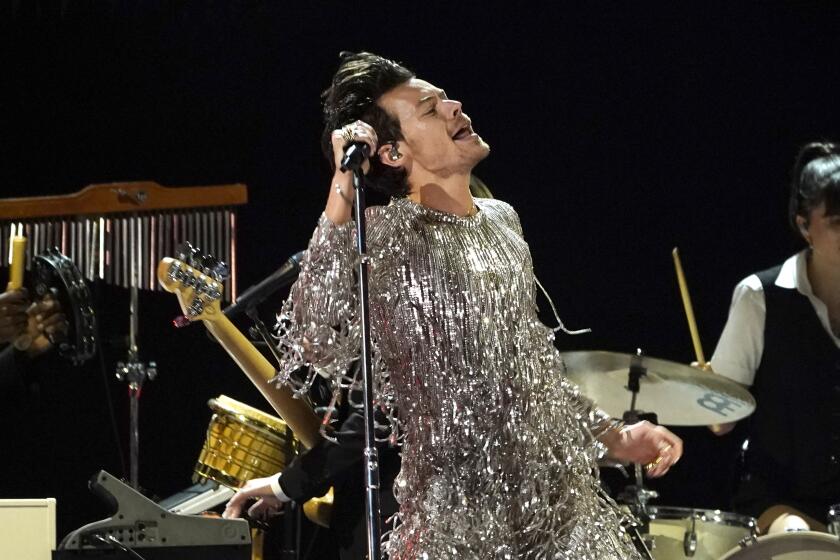Eitzel Still Hoping for the Best, Expecting Worst
“Hello, shoppers,” said Mark Eitzel from the stage at the back of Amoeba Records on Tuesday. “Buy my records. Or don’t.”
The statement kicked off his in-store performance in the well-lighted, warehouse-like Hollywood shop, with about 100 fans crowded in the aisles near the stage while others went about their shopping elsewhere. It was typical Eitzel. He may express indifference, but it’s a ruse, a defense mechanism.
The Bay Area bard really does want people to buy his records; he just expects that they won’t. And in song, he really does want to find love; he just expects that he won’t.
That, since his days leading the prized but under-most-radar American Music Club and through an only slightly higher-profile solo career, has made him sometimes hard to read, perhaps no more so than in his interpretations of an odd assortment of standards and obscurities on his new album, “Music for Courage & Confidence.”
Wryly subtitled “Sentimental Hits of the ‘40s, ‘50s, ‘60s, ‘70s and ‘80s,” the album sees Eitzel toying with songs ranging from “I’ll Be Seeing You” to Culture Club’s “Do You Really Want to Hurt Me,” sometimes illuminatingly so, but other times stumbling on the fine line between sincere and cynical.
Tuesday, the three songs from that album that he included in the brief performance fell mostly on the sincere side, thanks in part to the directness of his presentation (solo acoustic guitar with a little low-key electric guitar support from Tim Easton) and relatively outgoing attitude. Anne Murray’s 1970 hit “Snowbird” was played for melancholy, not sentimentality. Phil Ochs’ resigned “Rehearsal for Retirement” sounds like a song Eitzel was born to sing. And though he gave a little lounge-y body English to Kris Kristofferson’s “Help Me Make It Through the Night,” it still seemed an earnest plea.
Two new songs, though, showed new directions for his substantial writing talents, both starting as frivolous stream of consciousness exercises but slyly settling into arresting social criticism. One used the image of a male stripper as an analogy for superficial patriotism, the other sort of updated Simon & Garfunkel’s “At the Zoo,” evaluating members of the animal kingdom by putative musical tastes. Of course, he never said if any critters like his music.
More to Read
The biggest entertainment stories
Get our big stories about Hollywood, film, television, music, arts, culture and more right in your inbox as soon as they publish.
You may occasionally receive promotional content from the Los Angeles Times.






